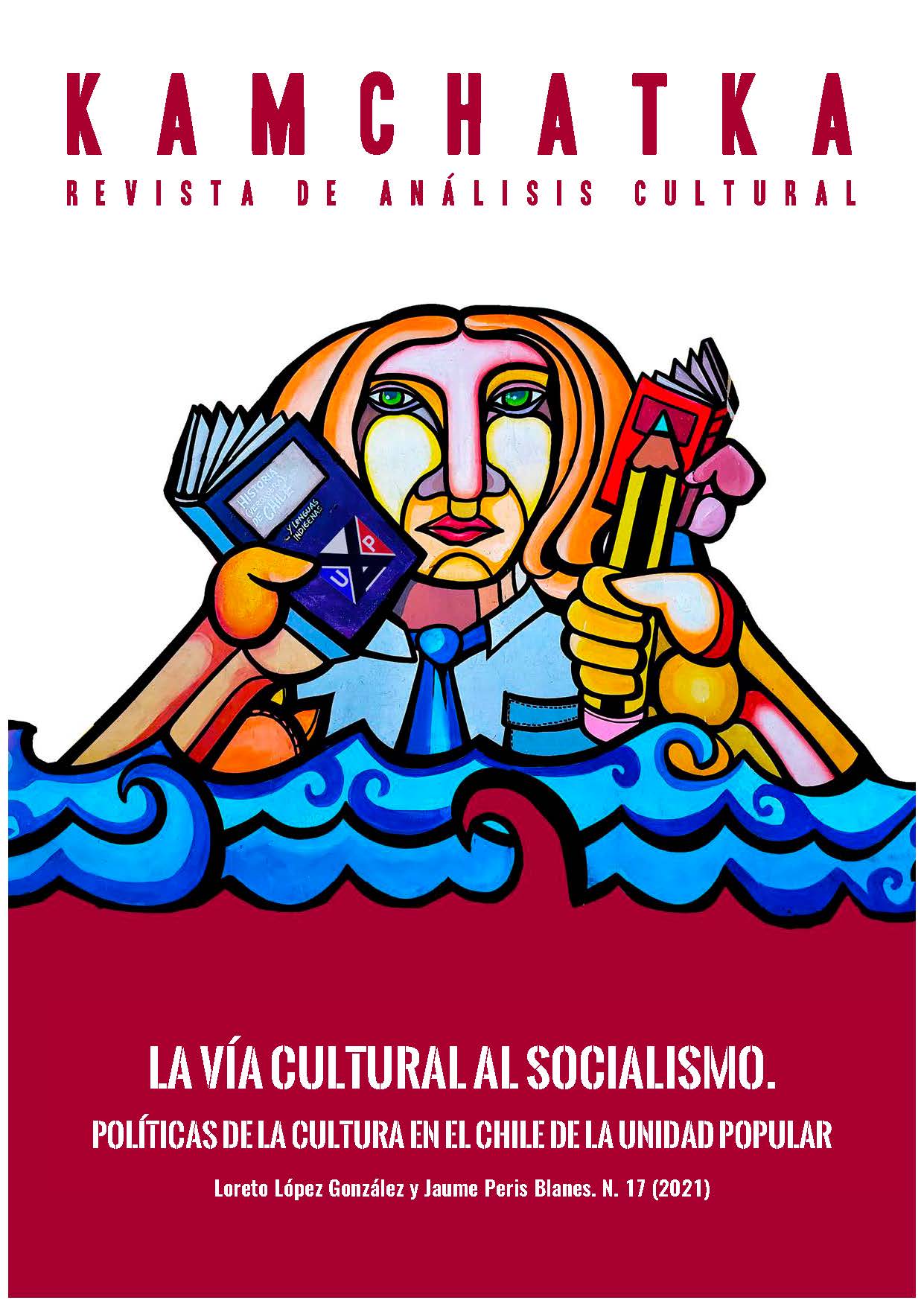En la quebrá del ají. Rock in Chile in Times of Revolution, 1967-1973.
DOI:
https://doi.org/10.7203/KAM.17.18297Keywords:
rock, juventud, cultura, Nueva Canción, festival, disco, historia cultural Abstract
Abstract
When the reform and the revolution led to a Chilean path towards socialism, historically experienced by the Popular Unity project between the years 1970 and 1973, a musical genre was transformed into a whole cultural experience. In this way it rhymed its origin with the consolidation and construction of a national identity, at the same time as it did with the process of progressive construction of a socialist Chile. At a time where the musical scene of the New Chilean Song was hegemonic, as a representative of contingent politics, rock broke out as a relevant social experience. Its antecedents can be traced from the mid-1950s in terms of social reception, and to the end of the same decade in terms of musical performance. Rock thus became a vestige worthy of being taken into account by the historiography of the period, and one of the most interesting cultural expressions from that time to the present. It was a symbol and representation of a social process.
 Downloads
Downloads
 References
References
Albornoz, César. En busca del tiempo perdido. El origen del rock nacional en Santiago de Chile, 1945-1967. Tesis de Doctorado en Historia. Pontificia Universidad Católica de Chile, 2018.
Chartier, Roger. El mundo como representación. Barcelona, Gedisa, 1992.
Correa, Sofía (et. Al) Historia del siglo XX chileno. Santiago, Sudamericana, 2001.
García, Marisol. Canción valiente 1960-1989: tres décadas de canto social y político en Chile. Ediciones B, 2013.
González, Yanko y Carlos Feixas. La construcción histórica de la juventud en América Latina. Bohemios, Rockanroleros & Revolucionarios. Cuarto Propio, 2013.
Hobsbawm, Eric. Revolucionarios. Crítica, 2017.
McSherry, J. Patrice, La nueva canción chilena: el poder político de la música, 1960-1973. Lom, 2017
Palominos, Simón e Ignacio Ramos, editores. Vientos del pueblo: representaciones, recepciones e interpretaciones sobre la Nueva Canción Chilena. Lom, 2018
Ponce, David. Prueba de sonido. Primeras historias del rock en Chile (1956-1984). Ediciones B, 208.
Rodríguez Musso, Osvaldo, Cantores que reflexionan: notas para una historia personal de la nueva canción chilena. Hueders, 2015
Vial, Gonzalo. Historia de Chile en el siglo XX. Sociedad Comercial y Editorial Santiago, 2003.
Fuentes impresas
“Beat 4. El hábito no hace al monje”. Ritmo de la Juventud, Nº 109, 3 de octubre de 1967, s/p.
El Clarín, 15 de agosto de 1970.
El Clarín, 12 de octubre de 1970.
El Mercurio, 12 de octubre de 1970.
Puro Chile, 18 de enero de 1973.
Ramona, Nº 63, 9 de enero de 1973.
Ritmo de la juventud, Nº 79, 7 de marzo de 1967.
Filmografía
Blackborad jungle. Dirigida por Richard Brooks, Estados Unidos, Metro Goldwin Mayer, 1955
Jailhouse’s rock. Dirigida por Richard Thorpe Estados Unidos, Metro Goldwin Mayer, 1957.
Discografía
Aguaturbia. Aguaturbia. Arena, 1970. L.P.
Aguaturbia. Aguaturbia, volumen 2. 1970, LP:
Aguaturbia. Psychedelic Drugstore. Background Records, 1993. Disco Compacto.
Amerindios. “Hoy es el primer día del resto de tu vida”. RCA Victor, 1971. Single.
Amerindios. Tu sueño es mi sueño, tu grito es mi canto… IRT, 1972. L.P.
Ángel Parra. Ángel Parra y su guitarra. Vol. 1. Demon, 1965. L.P
Ángel Parra, Canciones funcionales. DICAP, 1969. L.P.
Congreso. El Congreso. EMI Odeon, 1971. L.P.
Congregación. Congregación viene…, IRT., 1972. L.P.
Inti Illimani. En Canto al programa. Dicap, 1970. L.P.
Los Beat 4. Boots a Go-Go. RCA Víctor, 1967. L.P
Blops. Blops. DICAP, 1970. L.P.
Blops. Del volar de las palomas. Peña de los Parra, 1972. L.P.
Kissing Spell. Los pájaros. Arena, 1970. L.P.
Los Jaivas. El volantín. RCA Victor, 1971. L.P.
Los Jaivas, “Todos juntos”. IRT, 1972. Single.
Los Jaivas. Los Jaivas. IRT, 1973. L.P.
Los Mac’s. Kaleidoscope men. RCA Víctor, 1967. L.P
Los Red Juniors. “Al pasar esa edad”. RCA Víctor, 1964. Single.
Peter Rock. “Recuerdo de juventud”. RCA Víctor, 1963. Single.
Quilapayún. El pueblo unido jamás será vencido. Pathé Marconi, 1974. L.P.
Víctor Jara. Pongo en tus manos abiertas... Dicap-Jota Jota, 1969. L.P
Víctor Jara. El derecho de vivir en paz. Dicap, 1971. L.P.
Vidrios Quebrados. Fictions. UES Producciones, 1967. L.P.
Downloads
Published
How to Cite
-
Abstract1123
-
Artículo PDF (Español)753
Issue
Section
License
This journal provides an immediate free access to the content on the principle that freely make investigation available to the public, which promotes an increased global knowledge exchange.
Unless otherwise indicated, texts published in this journal are under the license Attribution-NonComercial 4.0 by Creative Commons. These texts may be copied, distributed and publicly communicated whenever the publication’s author and title are quoted and whenever they are not used for commercial purposes. In any case, intellectual property of the articles and its potential economic rights entirely belong to its authors.
The full license can be consulted on https://creativecommons.org/licenses/by-nc/4.0/. We encourage authors to disseminate papers published in Kamchatka. Journal of cultural analysis electronically, in institutional digital repository or in their websites.





